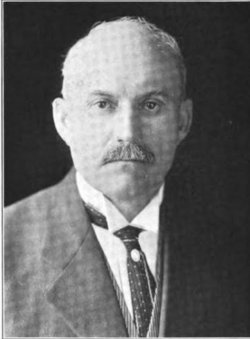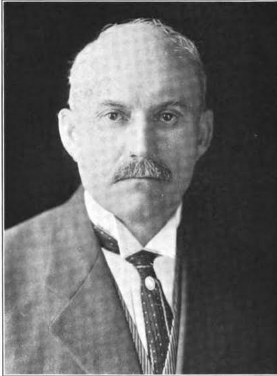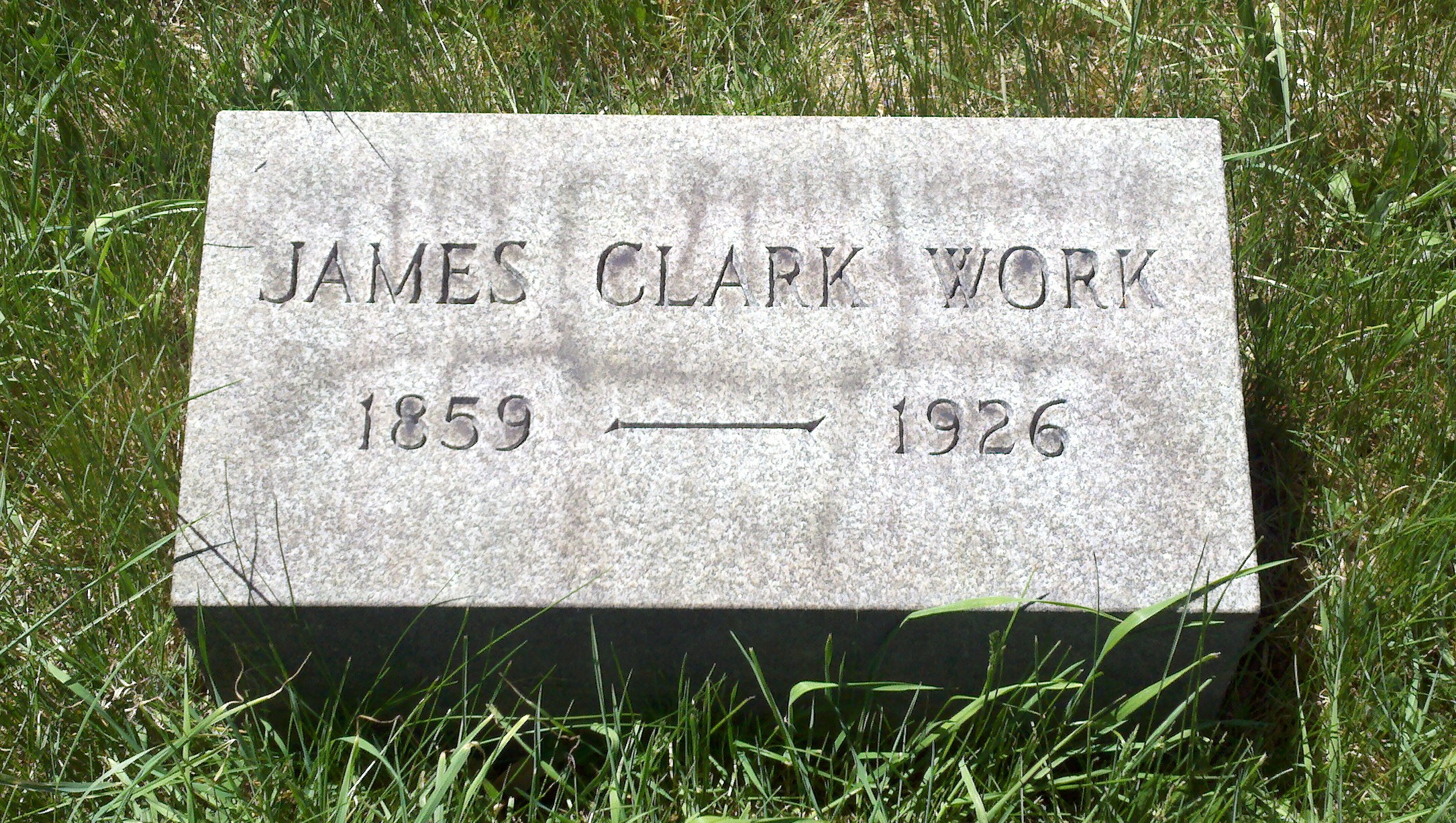JUDGE JAMES C. WORK, ORPHANS COURT, DIES
ILL LESS THAN A WEEK, DEATH OF JURIST A SHOCK
Left office at Noon Last Wednesday-Pneumonia Develops
DIED 2 A. M. TODAY
Lapsed Into Unconsciousness at 3 O'clock Yesterday Afternoon
Hon. James Clark Work, president Judge of the Separate Orphans Court of Fayette County, died at his home on West Main street, at 2 o'clock this Wednesday suffering twith a heavy cold. On Friday morning he developed pnemonia and his condition gradually became worse. He lapsed into unconsiousness at 3 o'clock yesterday afternoon and remained unconscious until the end came at 2 o'clock this morning. Dr. J. A. Litchfield, widely known specialist, came here from Pittsburgh yesterday for consultation. Yesterday afternoon oxygen was administered in a futile attempt to check the ravages of the disease.
The critical condition of the Fayette county jurist was apparent a few days ago and everything possible done to relieve him.
At the bedside when death came were the immediate members of his family, including Mrs. Work and three sisters of the jurist, Mrs. A. M. Henshaw, of Lincoln street, Mrs. Adam Nicholson, of Franklin township, and Mrs. Belle Chalfant, of Brownsville.
Funeral arrangements will be made during the day.
Announcment of the death of Judge Work will come as a tremendous shock to a wide circl of friends, associates and acquaintances in Fayette county this morning. While his condition had been regarded as serious few knew of the critical turn that came Monday and developed into the crisis yesterday.
Judge Work had long been a leader in his profession. He was serving his second term as president judge of the Separate Orphans Court of Fayette County. The term would have expired the first Monday in January, 1928.
As a jurist he won wide recognition for his ability and judicial temperament. His administration of the Orphans Court attravted not onle the respect and admiration of the members of the Bar here but those in many other counties of the state.
A man of strong character, honest and unswerving in the right, he occupied a unique place in the hearts and lives of the people of Fayette county who mourn his death with a deep sense of loss.
Judge James Clark Work, sixth child of John and Sarah McLaughlin Work, was born on the farm settled by his grandfather in Dunbar township, February 8, 1839. He attended the Sandy Hollow district school, and afterv a prepartory course entered Waynesburg college, where he pursued a classical course and was graduated in the class of 1884. He was a member of the Union Literary Society while in college and took an active part insociety work. In the fall of 1884 he entered the law school of the University of Michigan at Ann Arbor, continuing one year. He then, in the fall of 1885 entered the law school at Yale, passing the examination for entrance to the senior class. He was graduated LL B., class of 1856. Before leaving New Haven he passed the required examination and was admitted to practice in the supreme court of Connecticut. He then returned to Fayette county, locating in Uniontown, entering the office of Alfred Howell, then a leader of the Fayette County Bar. He familiarized himself with Pennsylvania law and procedure, and on December 6, 1886, was admitted to the Fayette County Bar. In January, 1887, he opened a law office in Uniontown where he practiced his profession alone until 1889. In that year he formed a law partnership with William A. Hogg, continuing for three years as Work and Hogg.
The partnership was dissolved and he resumed practice alone, never again having a partner. He was an honorable, successful lawyer and always stood high at the bar. In 1907 the Pennsylvania legislature passed an act creating a separate orphans' court for Fayette county and in May, 1907, the governor appointed James Clark Work judge of that court, which position on the bench he had held continuously, He was sworn in June 6, 1907. The party primaries having been held the Republican county committee met and nominated Judge Work to suceed himself. The Democratic committee indorsed the nomination although the candidate was an uncompromising Republican, and had done more than any other man to wrest party control of Fayette county from them. The Prohibition party and the Citizaens party also indorsed his candidacy, so he was the unanimous choice of the county.
At the following election 16,500 votes were cast and of these greatly over 15,000 bore the name of Judge Work. He thus becam judge of the orphans' court by an almost unanimous county vote for a term of ten years. Prior to the appointment of a temporary judge by the governor and after passing of the act creating the Fayette county orphans' court, the Bar Association of Fayette county met and recommended the appointment of James Clark Work for the position.
Judge Work was a staunch Republican. He cast his first presidential vote for James A, Garfield, and in 1893 was chosen chairman of the Fayette county Republican committee, serving until 1895, In 1893 under his leadership the first Republican county ticket was elected. In 1894 the victory was duplicated and Fayette became a debatable instead of a sure Democratic county. In view of this fact the indorsement of Mr. Work for the judgeship was indeed high appreciation.
Judge Work was a member of the First Presbyterian church of Uniontown and belonged to Fayette Lodge No. 228, Free and Accepted Masons; Uniontown Chapter, Royal Arch Masons; Uniontown Commandery
, Knights Templar; Uniontown Lodge of Perfection and Pittsburgh Consistory, Ancient Accepted Scottich Rite, in which he held the 32nd degree. He was a member of the American, State and Fayette County Bar Association, and the Uniontown Coun
Judge Work married April 16, 1903, Mrs. Edlwina Null Fuller, born in Westmoreland county, a daughter of Harrison Null, of Greensburg.
From contributor James Gottling.
JUDGE JAMES C. WORK, ORPHANS COURT, DIES
ILL LESS THAN A WEEK, DEATH OF JURIST A SHOCK
Left office at Noon Last Wednesday-Pneumonia Develops
DIED 2 A. M. TODAY
Lapsed Into Unconsciousness at 3 O'clock Yesterday Afternoon
Hon. James Clark Work, president Judge of the Separate Orphans Court of Fayette County, died at his home on West Main street, at 2 o'clock this Wednesday suffering twith a heavy cold. On Friday morning he developed pnemonia and his condition gradually became worse. He lapsed into unconsiousness at 3 o'clock yesterday afternoon and remained unconscious until the end came at 2 o'clock this morning. Dr. J. A. Litchfield, widely known specialist, came here from Pittsburgh yesterday for consultation. Yesterday afternoon oxygen was administered in a futile attempt to check the ravages of the disease.
The critical condition of the Fayette county jurist was apparent a few days ago and everything possible done to relieve him.
At the bedside when death came were the immediate members of his family, including Mrs. Work and three sisters of the jurist, Mrs. A. M. Henshaw, of Lincoln street, Mrs. Adam Nicholson, of Franklin township, and Mrs. Belle Chalfant, of Brownsville.
Funeral arrangements will be made during the day.
Announcment of the death of Judge Work will come as a tremendous shock to a wide circl of friends, associates and acquaintances in Fayette county this morning. While his condition had been regarded as serious few knew of the critical turn that came Monday and developed into the crisis yesterday.
Judge Work had long been a leader in his profession. He was serving his second term as president judge of the Separate Orphans Court of Fayette County. The term would have expired the first Monday in January, 1928.
As a jurist he won wide recognition for his ability and judicial temperament. His administration of the Orphans Court attravted not onle the respect and admiration of the members of the Bar here but those in many other counties of the state.
A man of strong character, honest and unswerving in the right, he occupied a unique place in the hearts and lives of the people of Fayette county who mourn his death with a deep sense of loss.
Judge James Clark Work, sixth child of John and Sarah McLaughlin Work, was born on the farm settled by his grandfather in Dunbar township, February 8, 1839. He attended the Sandy Hollow district school, and afterv a prepartory course entered Waynesburg college, where he pursued a classical course and was graduated in the class of 1884. He was a member of the Union Literary Society while in college and took an active part insociety work. In the fall of 1884 he entered the law school of the University of Michigan at Ann Arbor, continuing one year. He then, in the fall of 1885 entered the law school at Yale, passing the examination for entrance to the senior class. He was graduated LL B., class of 1856. Before leaving New Haven he passed the required examination and was admitted to practice in the supreme court of Connecticut. He then returned to Fayette county, locating in Uniontown, entering the office of Alfred Howell, then a leader of the Fayette County Bar. He familiarized himself with Pennsylvania law and procedure, and on December 6, 1886, was admitted to the Fayette County Bar. In January, 1887, he opened a law office in Uniontown where he practiced his profession alone until 1889. In that year he formed a law partnership with William A. Hogg, continuing for three years as Work and Hogg.
The partnership was dissolved and he resumed practice alone, never again having a partner. He was an honorable, successful lawyer and always stood high at the bar. In 1907 the Pennsylvania legislature passed an act creating a separate orphans' court for Fayette county and in May, 1907, the governor appointed James Clark Work judge of that court, which position on the bench he had held continuously, He was sworn in June 6, 1907. The party primaries having been held the Republican county committee met and nominated Judge Work to suceed himself. The Democratic committee indorsed the nomination although the candidate was an uncompromising Republican, and had done more than any other man to wrest party control of Fayette county from them. The Prohibition party and the Citizaens party also indorsed his candidacy, so he was the unanimous choice of the county.
At the following election 16,500 votes were cast and of these greatly over 15,000 bore the name of Judge Work. He thus becam judge of the orphans' court by an almost unanimous county vote for a term of ten years. Prior to the appointment of a temporary judge by the governor and after passing of the act creating the Fayette county orphans' court, the Bar Association of Fayette county met and recommended the appointment of James Clark Work for the position.
Judge Work was a staunch Republican. He cast his first presidential vote for James A, Garfield, and in 1893 was chosen chairman of the Fayette county Republican committee, serving until 1895, In 1893 under his leadership the first Republican county ticket was elected. In 1894 the victory was duplicated and Fayette became a debatable instead of a sure Democratic county. In view of this fact the indorsement of Mr. Work for the judgeship was indeed high appreciation.
Judge Work was a member of the First Presbyterian church of Uniontown and belonged to Fayette Lodge No. 228, Free and Accepted Masons; Uniontown Chapter, Royal Arch Masons; Uniontown Commandery
, Knights Templar; Uniontown Lodge of Perfection and Pittsburgh Consistory, Ancient Accepted Scottich Rite, in which he held the 32nd degree. He was a member of the American, State and Fayette County Bar Association, and the Uniontown Coun
Judge Work married April 16, 1903, Mrs. Edlwina Null Fuller, born in Westmoreland county, a daughter of Harrison Null, of Greensburg.
From contributor James Gottling.
Family Members
Sponsored by Ancestry
Advertisement
Advertisement















